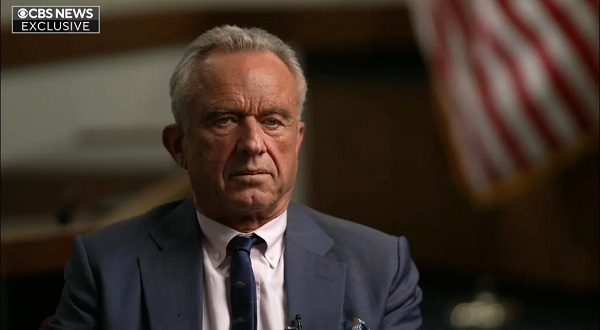Business
Trump’s ‘Liberation Day’ – Good News for Canadian Energy and Great News for WCSB Natural Gas

By Maureen McCall
April 2 was ‘Liberation Day’ according to U.S. President Donald Trump. While the announcement of U.S. reciprocal tariffs was not good news for many countries, Trump’s announcement also had some good news for Canadian Energy companies – 0% tariffs. Some tariffs against Canada are still in place, but for now, no energy sector tariffs against Canada underscores the importance of Canadian energy to the Trump administration.
President Trump announced new tariffs on April 2nd, which he dubbed “Liberation Day” with a 10% baseline tariff for all U.S. trading partners, to go into effect on April 5th. He also announced more reciprocal tariffs against the “worst offenders,” which will go into effect on April 9th but no tariffs on Canadian energy were announced.

Trump’s Reciprocal Tariffs Announcement
Alberta Premier Danielle Smith celebrated the win which she says is precisely what she has been advocating for from the U.S. Administration for months.
“The United States has decided to uphold the majority of the free trade agreement (CUSMA) between our two nations. It also appears this will continue to be the case until after the Canadian Federal election has concluded and the newly elected Canadian government is able to renegotiate CUSMA with the U.S. Administration. It means that the majority of goods sold into the United States from Canada will have no tariffs applied to them, including 0% tariffs on energy, minerals, agricultural products, uranium, seafood, potash and a host of other Canadian goods.”
This is great news for Canadian energy producers, especially natural gas producers who are experiencing dramatic growth in the Montney.
At this year’s S&P Global CERAWeek, Mike Verney, Executive Vice-President of petroleum reserves with McDaniel & Associates Consultants Ltd. had great news for Canadian companies.
McDaniel’s study, commissioned by the Alberta Energy Regulator (AER), reported data indicating that Alberta has proven natural gas reserves of 130 trillion cubic feet (TCF), compared to previous provincial estimates of only 24 TCF. According to the study, if probable gas reserves are added in, the overall figure is 144 TCF.
As reported in the Financial Post, Verney said “We’re growing like mad in the Montney. The major natural gas plays in the U.S. are actually declining versus the Montney that is actually growing.”
This message was echoed by Michael Rose, the Chairman, President and Chief Executive Officer of Tourmaline Oil, Canada’s largest natural gas producer during his keynote address at the SPE Canadian Energy Technology Conference and Exhibition last month in Calgary.
Not a Sunset Industry

Michael Rose – Chairman, President and Chief Executive Officer of Tourmaline Oil
Rose opened his keynote speech with optimism saying: “This is not a sunset industry- it is closer to sunrise than sunset” and spoke about Canada’s compelling opportunity for natural gas production as well as Tourmaline’s successes.
Reuters reports that analysts are wondering about the U.S.’s ability to meet the demand growth of booming liquefied natural gas (LNG) projects and also to meet huge domestic demand for natural gas-fired electricity generation to supply new data centre growth. Canada’s resources in Alberta’s Deep Basin and the North East BC Montney will be a huge supply source.
Deep Basin and the Montney are where the most competitive gas plays are found, and where Tourmaline operates as well as producing oil in the Peace River Triassic Lake.
Rose credits technology development and the building and ownership of midstream infrastructures as keys to affordability and profitability for Canadian companies which can control costs by controlling more of the production cycle. In addition, AI optimization has helped the company increase production. He also pointed out the environmental advantage of natural gas production. Since society needs the energy density of hydrocarbons to power industries, natural gas is the best choice as it is “the cleanest member of the fossil fuel stack.” He quoted Arjun Murti– 30 year Wall Street research analyst, buy-side investor, and advisor covering the global energy sector now with Veriten.com who asserts that there is no real energy transition and the only thing humans have actually transitioned off in the energy world is whale oil.
Rose said that 2022 statistics indicated the world set a record for all sources of energy. He pointed out that coal was supposed to replace wood 200 years ago, and it still hasn’t while wood, which has been renamed as biomass is still 7% of the overall energy stack.
The Golden Age of Gas
Rose’s natural gas outlook to 2028 in Canada was rosy saying gas “never looked better.” Beyond 2028 also looks good with a proliferation of electricity generation planned to feed data centre growth. In Alberta alone, 15 projects are in queue which will create a material increase in demand. In the U.S. however, some large U.S. natural gas supply basins have reached a tipping point with only 50% estimated ultimate recovery (EUR) left. Rose reported that drilling inventory is an issue in the U.S. but not in Canada. For example, Tourmaline has over 20 years of Tier 1 drilling inventory left while its U.S. peers don’t have the same luxury. He noted that U.S. M&A is currently driven by a quest for inventory. He noted that U.S. companies will chase profitable acquisitions in a quest for inventory to lower future costs saying “Things are still cheap in Canada.”
Canadian Resources – Will we ever be an energy superpower?
With global exploration down sharply, focus has turned to the WCSB where in the case of the Montney, only 5% has been produced so far.
“All you hear about is the western Canadian sedimentary basin and it is a monster, and it is the gift that keeps on giving, but we’re actually blessed with multiple other opportunities. Like the U.S., a number of them are off limits for government policy reasons, but certainly changes are in order.”
Some of the undeveloped basins in Canada which Rose referred to as “forbidden basins” are located on the West Coast and in the lowlands in Quebec. The tariff issue may be changing attitudes towards oil and gas development in those areas. Dealing with an unsupportive Federal Government for the last decade has made capital attraction difficult. Routine talk about phasing out Oil and Gas and the series of regulations, bills and initiatives that have stalled basin development and new pipelines have taken its toll. It has discouraged capital from flowing into the sector – a period that Rose said “ felt like an endless hurricane.”
So what is the right path forward?
The challenge for industry and policymakers is finding the right balance between energy and the environment according to Rose. He advises that setting unrealistic goals and timelines that are not based in science/technology or economics won’t work, and notes a shift away from the time frame set by net zero.
“We look at the whole environment, air, land and water, and we develop plans to improve performance in all three. We have a group of young engineers working on what amounts to an embedded clean tech business within our company, and I think they’re having a lot of fun doing it.”
One of Tourmaline’s longest initiatives, is the conversion of drilling rigs from diesel to natural gas, using field gas for fuel. The result is that projects have an improved economic return as well as reduced emissions. Rose says this year, Tourmaline will cross a “200 million barrier” and will have displaced 200 million litres of diesel and save $200 million including the makeup gas used. He says they like to think of it as a drill bit to burn initiative.
Mike Rose still had an optimistic view of the path forward for energy companies that is certainly more relevant after yesterday’s “Liberation Day” announcement from Trump.
“We’ve missed 10 years of opportunities,” Rose said. “It would have made us so much stronger than we are today as an industry and a country. Still, late is better than never. The only thing I’ll say about tariffs is that they are just another curve ball. We’ve had nothing but curve balls for 10 years, and we’ll figure out how to hit this one too. Given how integrated both countries’ energy systems are and will continue to be, I think a great narrative that just might appeal is: ‘Let’s make North America the world’s preeminent energy and oil and gas superpower’.”
Maureen McCall is an energy professional who writes on issues affecting the energy industry.
Business
Musk Slashes DOGE Savings Forecast By 85%


From the Daily Caller News Foundation
By Thomas English
Elon Musk announced Thursday that the Department of Government Efficiency (DOGE) is now targeting $150 billion in federal savings for fiscal year 2026 — dramatically scaling back earlier claims of slashing as much as $2 trillion.
Musk initially projected DOGE would deliver $2 trillion in savings by targeting government waste, fraud and abuse. That figure was halved to $1 trillion earlier this year, but Musk walked it back again at Thursday’s Cabinet meeting, saying the revised $150 billion projection will “result in better services for the American people” and ensure federal spending “in a way that is sensible and fair and good.”
“I’m excited to announce we anticipate saving in FY ’26 from a reduction of waste and fraud a reduction of $150 billion dollars,” Musk said. “And some of it is just absurd, like, people getting unemployment insurance who haven’t been born yet. I mean, I think anyone can appreciate — I mean, come on, that’s just crazy.”
The announcement marks the latest in a string of revised projections from Musk, who has become the face of President Donald Trump’s aggressive federal efficiency agenda.
“Your people are fantastic,” the president responded. “In fact, hopefully they’ll stay around for the long haul. We’d like to keep as many as we can. They’re great — smart, sharp, finding things that nobody would have thought of.”
Musk originally floated the $2 trillion figure during campaign appearances last fall.
“I think we could do at least $2 trillion,” Musk said at the Madison Square Garden campaign rally in November. “At the end of the day, you’re being taxed — all government spending is taxation … Your money is being wasted, and the Department of Government Efficiency is going to fix that.”
By January, he softened expectations to a “really quite achievable” $1 trillion target before downsizing that figure again this week.
“Our goal is to reduce the deficit by a trillion dollars,” Musk told Fox News’ Bret Baier “Looked at in total federal spending, to drop the federal spending from $7 trillion to $6 trillion by eliminating waste, fraud and abuse … Which seems really quite achievable.”
DOGE’s website, which tracks cost-saving initiatives and contract cancellations, currently calculates total federal savings at $150 billion.
2025 Federal Election
Taxpayers urge federal party leaders to drop home sale reporting to CRA

Party leaders must clarify position on home equity tax
The Canadian Taxpayers Federation is calling on all party leaders to prove they’re against home equity taxes by pledging to immediately remove the Canada Revenue Agency reporting requirement on the sale of primary residences.
“Canadians rely on the sale of their homes to pay for their golden years,” said Carson Binda, CTF B.C. Director. “After the government spent hundreds of thousands of dollars flirting with home taxes, taxpayers need party leaders to prove they won’t tax our homes by removing the CRA reporting requirement.”
Right now, the profit you make from selling your home is exempt from the capital gains tax. However, in 2016, the federal government mandated that Canadians report the sale of their homes to the CRA, even though it’s tax exempt.
The Canada Mortgage and Housing Corporation also spent at least $450,000 to study and influence public opinion in favour of home equity taxes. The report recommended a home equity tax targeting the “housing wealth windfalls gained by many homeowners while they sleep and watch TV.”
“A home equity tax would hurt seniors saving for their golden years and make homes more expensive for younger generations,” Binda said. “If the federal government isn’t planning on imposing a home equity tax, then Canadians shouldn’t be forced to report the sale of their home to the CRA.”
-

 2025 Federal Election2 days ago
2025 Federal Election2 days agoResearchers Link China’s Intelligence and Elite Influence Arms to B.C. Government, Liberal Party, and Trudeau-Appointed Senator
-

 Business2 days ago
Business2 days agoTimeline: Panama Canal Politics, Policy, and Tensions
-

 COVID-192 days ago
COVID-192 days agoFauci, top COVID officials have criminal referral requests filed against them in 7 states
-

 2025 Federal Election2 days ago
2025 Federal Election2 days agoPoilievre Announces Plan To Cut Taxes By $100,000 Per Home
-

 Health2 days ago
Health2 days agoRFK Jr. Shuts Down Measles Scare in His First Network Interview as HHS Secretary
-

 Health2 days ago
Health2 days agoRed Deer Hospital Lottery – Previous Supporter Draw Deadline!
-

 Bjorn Lomborg2 days ago
Bjorn Lomborg2 days agoThe stupidity of Net Zero | Bjorn Lomborg on how climate alarmism leads to economic crisis
-

 International2 days ago
International2 days agoTrump White House will ignore reporter emails that include ‘preferred pronouns’ in signature






